The weekend before last, I spent 2 days in an exuberantly air-conditioned conference room in the Grand Hyatt in Washington, DC, catching up on the latest brain health research at PCRM‘s International Conference for Nutrition and the Brain. While the air was cool, the topics were hot—from the link between fat intake and dementia to the effects of exercise on memory.
In fact, the speakers presented so much great info that I can’t possibly cover it all! So, after much debate, I’ve narrowed the take-home points down to five. Without further ado, here they are:
1. Vegetables help keep your mind sharp
Just in case you needed another reason to eat more kale: it may protect your brain. Specifically, eating more vegetables (about 3-4 servings per day) is associated with a slower rate of cognitive decline as people age, according to data from the Chicago Health and Aging Project (CHAP) presented by Martha Morris, ScD.¹ (Sadly, there was no association with fruit consumption.) Morris noted that green leafy veggies like spinach and collards seemed to have the strongest associations with reductions in cognitive decline, possibly due to high levels of brain-protective compounds like lutein and vitamin E.
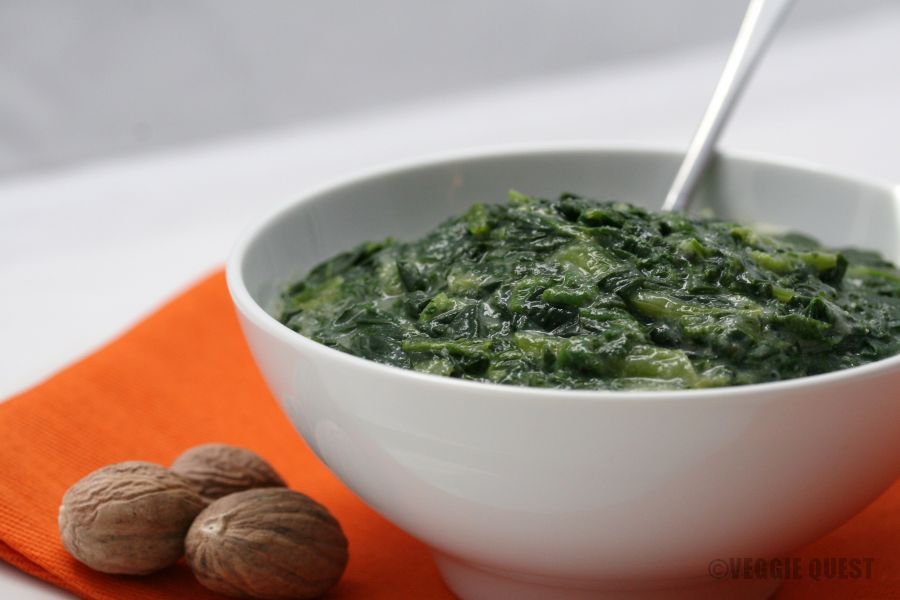 |
(Ready to dig in? How about some comforting creamed spinach or Swiss chard with raisins and pine nuts? Or, if you need some inspiration, try 7 Easy Ways to Eat More Vegetables)
2. Eating cupcakes is risky business…
…especially if they contain saturated or trans fat! Consuming high levels of saturated fat and trans fat is associated with an increased risk of Alzheimer’s Disease, according to Morris. She further discussed animal data that reinforces this finding: A diet high in saturated fat impairs memory and learning in rats compared with a low-fat diet.² Interestingly, in the CHAP study, Morris and her colleagues also found that people with high intakes of copper were more likely to experience cognitive decline—but only if they also ate high amounts of saturated and trans fats.³
What’s more, John McDougall, MD, pointed out that for people with Multiple Sclerosis (MS), data indicates that a difference of only 8 grams of saturated fat intake per day can increase the risk of dying from MS by three times.⁴
Where are these problematic fats found? Saturated fat shows up naturally in animal products (meat, poultry, butter, cheese) as well as in some plant foods like coconut, avocados, and nuts. Trans fats, on the other hand, are often added to baked goods to increase shelf life, although they also appear in some fried foods, margarines, pancake mixes, and frozen foods. (To steer clear of trans fats, check ingredient lists for hydrogenated oils.) Given my addiction to baked goods (I’m working on it!), this one’s going to be a toughie for me.
3. Meat may be hazardous to your [brain and nerve] health
Cupcakes aren’t the only problem, though. According to data from the first Adventist Health Study presented by Gary Fraser, PhD, meat eaters aged 65 and older had twice the risk of developing Alzheimer’s disease when compared to vegetarians.⁵
What’s more, Michael Greger, M.D., pointed out that men who ate the most meat were 21 times (not a typo!) as likely to have essential tremor as those who ate the least meat.⁶ (Essential tremor is disorder of the nervous system that usually causes shaking of the hands, but can also cause tremors of the head, voice, legs, etc., and generally worsens with age.) While no one has yet proven that meat can cause essential tremor, researchers hypothesize that a neurotoxic chemical found in cooked meats may be to blame.
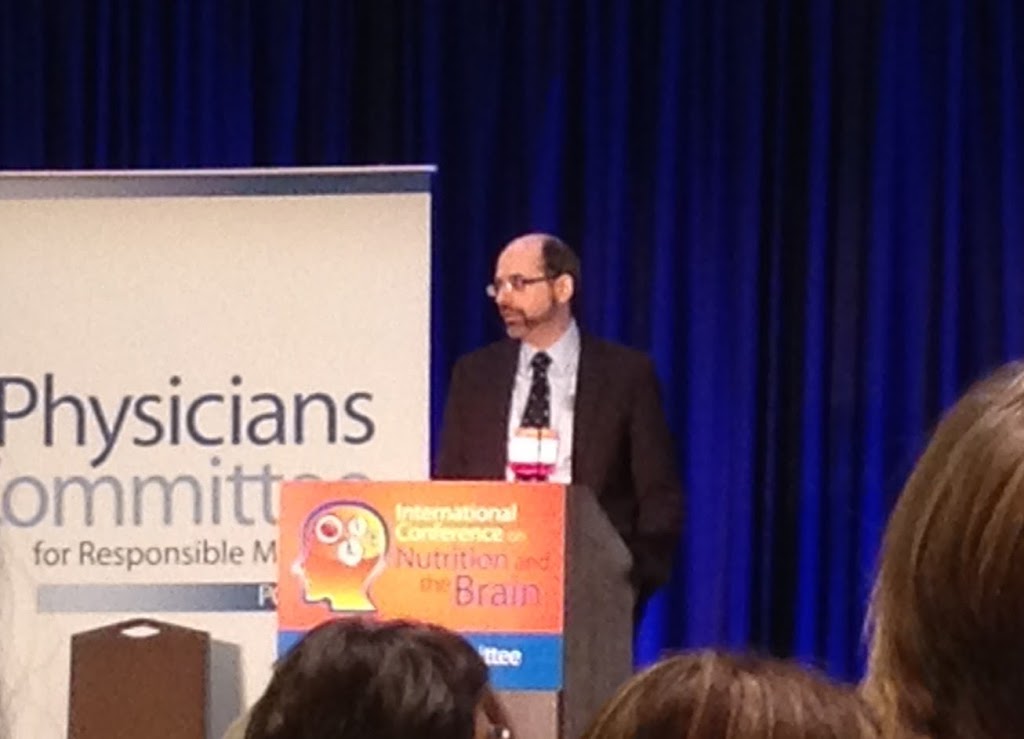 |
| Michael Greger, MD, updating attendees on the latest in nutrition and neurology |
4. Exercise builds your brain
According to Kirk Erickson, Ph.D., being sedentary is a risk factor for dementia, and some 21% of Alzheimer’s Disease cases in the U.S. may be attributable to physical inactivity.⁷ Yet Erickson noted that being active can reduce your risk of dementia and even help mitigate the effects of a gene, ApoE4, that puts those who carry it at increased risk.
Better still, exercise improves brain function across the board, from speeding up reaction time to improving spatial abilities and the ability to plan.⁸ What’s more, as mentioned in my smorgasbord post, a recent study conducted by Erickson and his colleagues showed that brisk walking actually grows the part of your brain that’s responsible for forming new memories.⁹ And it doesn’t take much—we’re talking 30-45 minutes of walking 3 times per week. I don’t know about you, but that’s pretty good motivation to lace up my sneakers and hit the road!
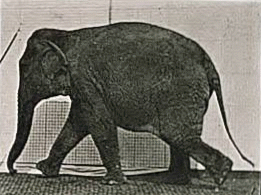 |
| Now we know why elephants never forget—all that walking! |
5. Eating a plant-based diet can help relieve anxiety and depression
Feeling frazzled? A bit blue? Data from a recent study conducted by PCRM found that following a low-fat vegan diet—avoiding all animal products, minimizing added oil, and taking a multivitamin to ensure adequate vitamin B12—led to significant improvements in reported symptoms of anxiety and depression. Researchers also found that those on the plant-based diet experienced improved work productivity. Now those are feel-good results!
 |
| Image by reebs* (Sunset Hopping) [CC-BY-2.0], via Wikimedia Commons |
Embracing brain health—and delicious food!
Coming away from the conference, I was encouraged by the fact that, while genes play a role, the little things we do—from choosing chard over cheese to taking a walk after dinner—may make the difference between keeping our brains sharp or literally losing our minds. Better still, making brain-boosting choices can be downright delicious, if the food served at the conference was any indication. I mean, check out this brain-healthy conference menu from Saturday:
Breakfast:
- Tofu scramble with ripe tomatoes, onions, cumin, and turmeric
- Sweet potato hash
- Whole grain toast
- Fresh sliced seasonal fruit and berries
Lunch:
- Soup: Sweet yellow peach and cucumber gazpacho with local mint oil
- Salads: Truffled asparagus with roasted oyster mushrooms and frisee salad, whole grain mustard dressing; Tuscan cannellini bean salad with ripe tomatoes, red onion, basil, lemon, and olive oil
- Entrees: Mushroom ravioli roasted eggplant-tomato confit; Spiced chickpea curry with saffron basmati rice
- Dessert: Apricot crunch bars, blueberry pomegranate sorbet
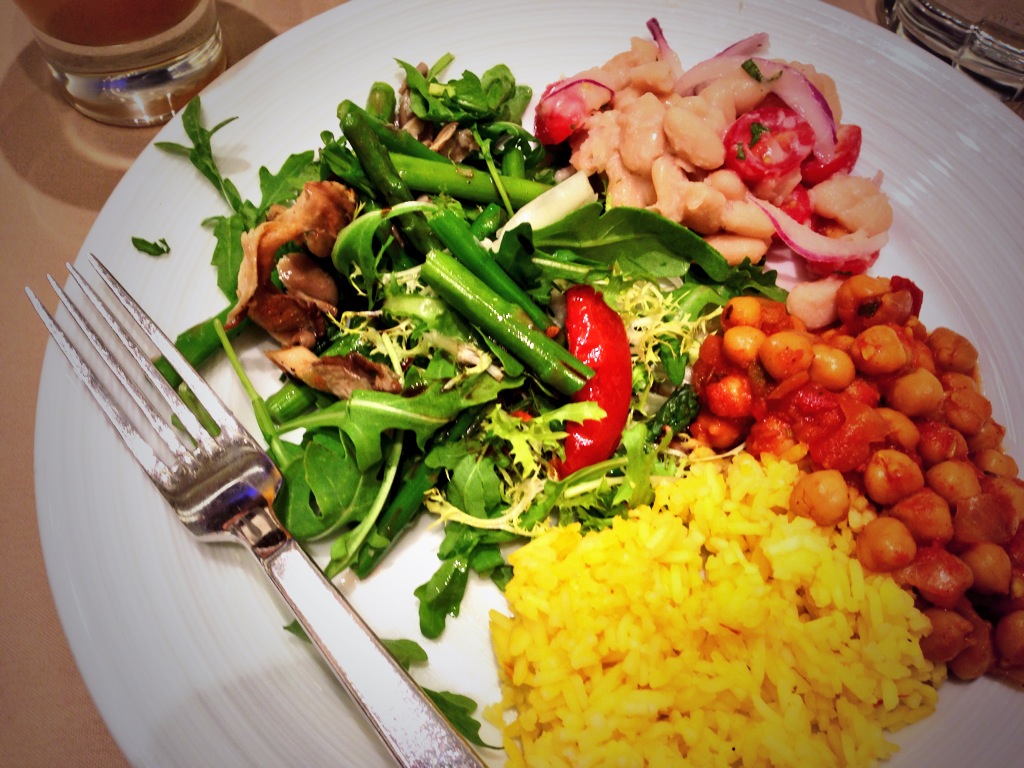 |
| Saturday’s brain power lunch |
So, with all this great inspiration in mind, I think I’m going to whip up some tasty veggies—maybe a fresh and light strawberry-jicama salad or crazy easy zucchini basil soup—and take stroll after dinner tonight.
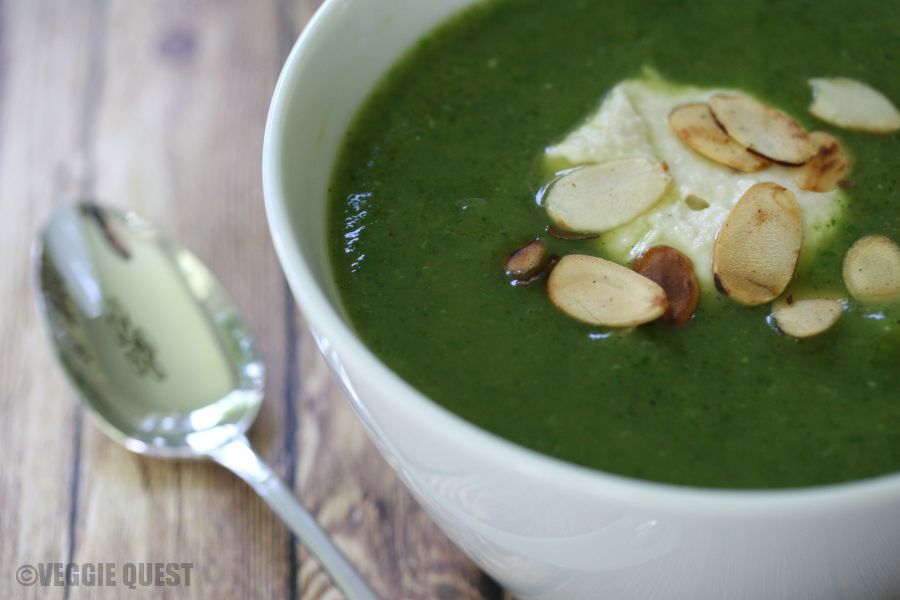 |
| Crazy Easy Zucchini Basil Soup |
What’s your plan for staying sharp? Do you have a brain-boosting recipe to share? If so, leave a comment and be sure to include a link to your recipe!
To learn more about the connection between diet and brain health—and what you can do to maximize your mental moxie—check out Dr. Neal Barnard’s fascinating new book, Power Foods for the Brain.
Shared on Thank Your Body Thursday, a hip, healthy blog hop!
References
1. Morris, Evans, Tangney, et. al., 2006.
2. Greenwood and Winocur, 1996.
3. Morris, Evans, Tangney, et. al., 2006.
4. Swank and Dugan, 1990.
5. Giem, Beeson, and Fraser, 1993.
6. Louis, Keating, Bogen, et. al. 2008.
7. Barnes and Yaffe, 2011.
8. Colcombe and Kramer, 2003.
9. Erickson, Voss, Prakash, et. al., 2011.
_____
Are you ready to like veggies? Subscribe to Veggie Quest and never miss a recipe! (WFPB, Vegan, Gluten-Free, Eat-to-Live friendly.)
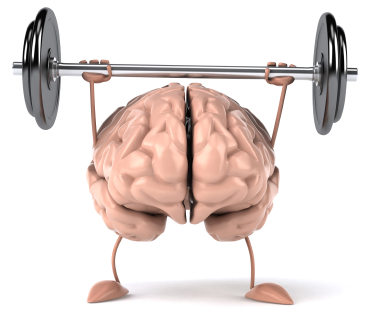


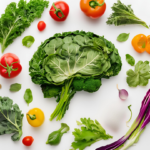
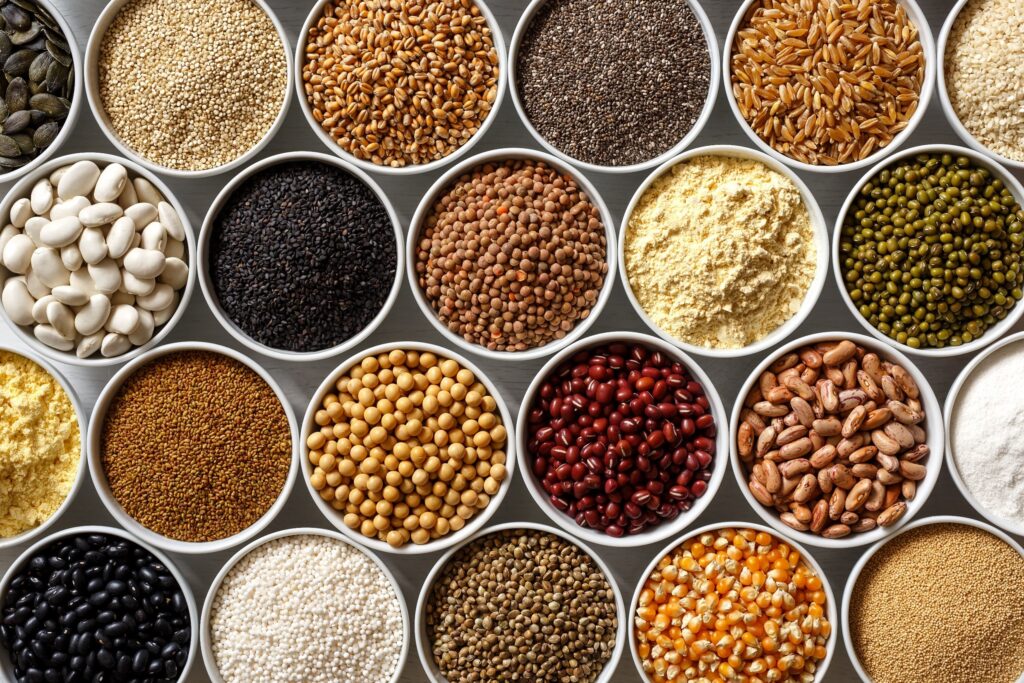

 I'm Lee, an RD thriving on a healthy plant based diet.
I'm Lee, an RD thriving on a healthy plant based diet.
Thanks for posting this! I find the information very useful… and I think it's making me realise I need to make more of a conscious effort to eat more veggies & less saturated fats (I'm a sucker for coconut & avocado!).
Hi Kimmy, glad it was useful! The low-fat thing is definitely a downer–I'm a sucker for avocado, too. (I could happily cut one open and eat it with a spoon.) <br /><br />That said, Dr. Neal Barnard did recommend eating an ounce of nuts a day (even though they have a little sat fat) because they have vitamin E, which is correlated with reduced dementia risk. And since avocado is also a good
My wife just made a new guacamole recipe that substituted 2/3 of the avocado with white beans. She claims she can't tell the difference. I say I definitely taste the beans, but it's a small sacrifice to reduce the fat by 66%, if you ask me.<br /><br />Now, if only I could have my cake, and eat it, too. ;o)
Tszeecous, what a great idea! I'll try it the next time I make guacamole and see how it goes. Does your wife use white beans? I've heard of people making guacamole out of peas, too, but haven't gone so far as to actually try it yet… 😉 <br /><br />On the cake…if only!
Very inspiring! Down with the fats and up with the exercise.
Easier said than done, I know! But the conference was really motivating, and I'm glad the post was, too. 🙂
"There was no significant difference in the incidence of dementia in the vegetarian versus meat-eating unmatched subjects. There was no obvious explanation for the difference between the two substudies, although the power of the unmatched sub-study to detect an effect of 'heavy' meat consumption was unexpectedly limited. There was a trend towards delayed onset of dementia in
Anonymous, I'm aware that the second sub-study failed to find a relationship between meat consumption and dementia. But that doesn't negate the fact that the first substudy did.<br /><br />Moreover, I find it interesting that you chose to omit the sentence immediately preceding the material you quoted from the abstract. That sentence: <br /><br />"The matched subjects who ate meat (
Thank you for sharing superb information. Your website is so cool.We are stunned at the main points that you’ve within this blog. It reveals how nicely someone perceives this subject. Bookmarked this site, will come back for extra articles.
Los Angeles Halls, thanks for the feedback! I'll do my best to keep writing posts that inform, entertain, and make healthy eating easy and fun!
There’s definately a lot to find out about this issue.
I like all of the points you made.